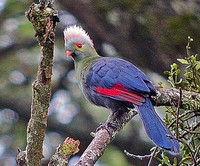|
| 질의: Yellow chat | 결과: 16번째/26 | |
The poorly-known endemic Prince Ruspoli's Turaco is endangered through forest clearance (Nik Borrow). For a selection of other photographs from Ethiopia, please see the 2009 tour description.

| 해상도: 395x328
파일크기: 73667 Bytes
등록시간: 2008:03:22 13:17:12
|
The poorly-known endemic Prince Ruspoli's Turaco is endangered through forest clearance (Nik Borrow). For a selection of other photographs from Ethiopia, please see the 2009 tour description.
The poorly-known endemic Prince Ruspoli's Turaco is endangered through forest clearance (Nik Borrow). For a selection of other photographs from Ethiopia, please see the 2009 tour description.
BirdQuest | ETHIOPIA
The poorly-known endemic Prince Ruspoli's Turaco is endangered through forest clearance (Nik Borrow). For a selection of other photographs from Ethiopia, please see the 2009 tour description.
Ethiopia, the ‘Roof of Africa’, is a rugged and ancient land that is home to 32 (more or less, depending on taxonomic treatment) sought-after endemic bird species (some of which are now shared with Eritrea) and arguably one of the most fascinating African countries for birding with new and exciting discoveries being made every year. Ethiopia bird tours using small coaches manage to see many of these endemics, but the remainder inhabit more remote regions and the primary aim of this special tour is to find the complete set of the country’s endemics (with the exception of the controversial ‘Nechisar Nightjar’, known only from a wing!) and virtually every other speciality of the country, something which involves some extra days, the use of more expensive (but more comfortable) 4-wheel-drive transport and a number of nights in very basic accommodations. The ‘missing endemics’ include the exceedingly localized Harwood’s Francolin, a species that lives below high cliffs amongst the dense stands of Typha reeds that cover gravely stream beds. Another is the enigmatic Prince Ruspoli’s Turaco, a rare relict species that was first described by Prince Ruspoli in 1896, although he was unfortunately killed by an elephant shortly afterwards and the exact site of the type specimen remains unknown! Although rediscovered in the 1940s, it hasn’t been until recently that sightings have become more regular. In the remote south, we shall search for the rare endemic Degodi Lark and Sidamo Long-clawed Lark, as well as the restricted-range African White-winged Dove, Somali Short-billed Crombec and Juba Weaver. Ethiopia is also renowned for its strange endemic serins and we will be hoping to find Yellow-throated, Ankober and Salvadori’s. Ethiopia is certainly a land of superlatives, unsurpassed in scenic grandeur by any other part of this ancient continent; a place where Lammergeiers soar over majestic gorges and robed horsemen gallop across the high plains. Here the Ethiopian Wolf hunts Giant Root-Rats among the grey cushion plants of the Afro-alpine moorlands, Gelada Baboons scramble up towering cliffs and graceful herds of Mountain Nyala browse along the edge of fragrant juniper forests. Birds pass unmolested lives in Ethiopia, with the result that the birdlife is not only spectacularly abundant but also remarkably tame. During the northern winter large numbers of Palearctic migrants enrich an already impressive avifauna, with the result that over 840 species of birds have been recorded from the country. Close to Addis Ababa, ringed by the peaks of the western highlands, we shall drive through the rolling grasslands of the high plateau where shimmering silver tarns are thronged with birds. Even on the doorstep of the capital we will find endemic birds, including Wattled Ibis, Blue-winged Goose, Rouget’s Rail, Abyssinian Longclaw and Lineated Pytilia. In the Jemma Valley the landscape will be completely different as we gaze across a vast panorama of arid gorges and rugged mountain ranges that stretch endlessly away towards the horizon. Here we will search for such endemics as Harwood’s Francolin, Black-winged Lovebird, Rüppell’s Black Chat, White-winged Cliff Chat and White-billed Starling. Moving on we will visit the eyrie-like village of Ankober, perched on the edge of a great escarpment, overlooking the forbidding Danakil Depression, where we shall hunt amongst the cloud-wreathed cliffs for the extremely localized Ankober Serin. Next we will descend into the Great Rift Valley to savour the rich birdlife of Awash National Park, which includes such specialities as Arabian Bustard, Yellow-breasted Barbet, Gillett’s Lark and Sombre Rock-Chat, and the game that wanders through the dry thornbush. Continuing through the Rift Valley we shall visit its chain of lakes, each one different in character but several teeming with waterbirds. Continuing on we will climb up into the southeastern highlands to the Bale Mountains National Park. Here on Africa’s highest road we will marvel at the stark beauty of these wild uplands with their spectacular Afro-alpine vegetation and unique collection of endemic birds including Spot-breasted Plover and Abyssinian Catbird. From here we shall make an excursion to Sof Omar to look for Salvadori’s Serin before heading southwards through the wild and extensive Harenna Forest deep into the acacia bushland in the Boran region of remote Sidamo province. Here in this remote part of Ethiopia we will look for some of Africa’s least-known species such as Prince Ruspoli’s Turaco, Sidamo Long-clawed Lark, the enigmatic Stresemann’s Bushcrow and the attractive White-tailed Swallow. Turning back north we will visit the remnant forest at Awassa and Wendo Genet, where hot springs bubble up through the lush vegetation and Yellow-fronted Parrots screech at each other in the fruiting figs, before finally returning to Addis Ababa.
|
댓글 |
|---|
| | 손님 |
|
Prince Ruspoli's Turaco (Tauraco ruspolii)
The Prince Ruspoli's Turaco or Touraco De Ruspoli (Tauraco ruspolii) is a species of bird in the Musophagidae family. It is endemic to Ethiopia.
Its natural habitat is subtropical or tropical dry forests. It is threatened by habitat loss. |
^o^
동물그림창고 똑똑전화 누리집
^o^
|
|
|